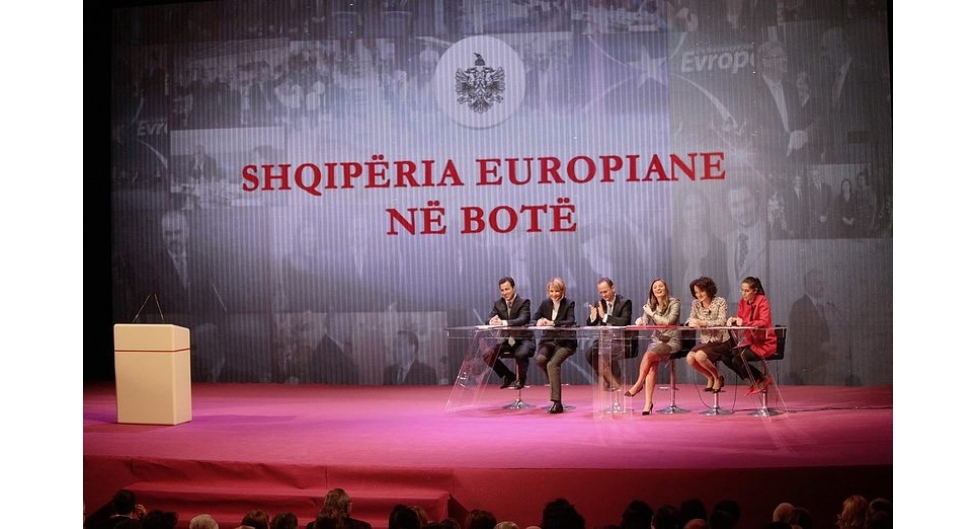
By Peter Tase
Albania has always been considered as a unique country where tolerance and co-existence in terms of religion and culture has been part of the society in the last centuries. Independently from historic and political settings, past records show that Albanians have demonstrated a friendly behavior towards each other’s religious propensity. The relations of Albanians with religion have always been evolving.
There are some valid questions to answer in today’s Albanian society in order to further understand on what is happening in a region that has a number of sects and religious interaction such as the Balkans.
These matters mainly focus in the risk of Albanian society to enliven religious conflict due to radicalization, a trend of religion to integrate itself and the risk of conflict between democratic institutions and religious hierarchy.
In order to analyze current behavior towards religion in Albania, there are some main features coming out of the Albanian society and its relation to religion.
First, generally Albanians have shows a pragmatic attitude which is also related to religion. Their ultimate values are more materially oriented than spiritually oriented. This mainly affects general attitude toward religion.
Secondly, it is necessary to emphasize Albanians’ tendency towards homogeneity which is reflected in their main core values as a society. Taking into consideration the variety of norms and values depending on social groups or sub-groups the individual is an essential part of it, when it comes to making generalizations, they tend to act consistently towards religion, faith and diversity. The salient characteristic of Albania’s decades long period under the communist regime was the establishment of an equal society in all aspects, including expectations and an equal social class for all, causing tremendous consequences in the burgeoning of social standards and a shifting attitude to reinforce “the power of the people” which it turned out be “a responsibility for all.”
In trying to differentiate between instrumental and religious values as well as cultural influences on them, even in historic arguments, there has been a distinction between Muslim believers and orthodox or catholic worshipers in their attitudes towards intellectual accomplishments and professional choices. The last two groups have historically been focused on their education and their scholarly work clearly testifies willingness for a greater flexibility and greater engagement in urbanization processes, an approach which is entirely different from the determination of Muslim believers who represent 70 percent of the population in Albanian society.
Religious heritage in the majority of the people in Albania and Kosovo is less influential towards determining each one’s social status, aspects that are more important deal with profession and academic preparation in each community. These social groups or subgroups belong to culture, age and profession, they represent variables which create a greater homogeneity in core values and cause differences in less important values such as religion and ethnic heritage. This is a possible explanation of having such a greater tolerance in Albania today, which is displayed towards diverse religious and ethnic groups.
Today is a perfect opportunity for the Albanian society and politicians, particularly the five month old government of Edi Rama, to recognize Albania’s accomplishments and historic blunders of the past as well as to view the future with new hopes, aspirations and see Albania become a full member of the European Union; a decades’ long aspiration from Albanian people, but not a genuine ambition for the political elites in Albania and Kosovo.
Europe Union, before becoming a common political and economic union, was first a cultural initiative, its roots are based deeply in the soul of every country. Based on the cultural prerogative, commenced the political and economic unification of Europe, in the 1950s. At a time when the old continent was facing the greatest challenges brought from the destruction of World War II.
Amid the ruins of war, the ideals of civilization and progressive conscience prevailed. At the same time, Europe, contrary to decades ago, today is not far away from Albanians, however this is not the merit and should not be credited to major political parties in Albania and Kosovo.
Indeed, major political parties in Albania and Kosovo, with their opaque movements, short sighted thinking and obscure politics, such irresponsible political elites have conscientiously kept on hold the path of their country’s integration to Europe. Albanian politicians understand that European Integration cannot be accomplished with corruption practices, nepotism and high level of crime, with a biased and controlled media and a fragile parliamentary democracy. These local political elites in Albania and Kosovo are aware that in Europe Union always reigns public security and the law, therefore their lack of leadership to tackle the endemic challenges of Albanian society, should not be pardoned, on the contrary, Albania’s and Kosovo’s Integration in the EU, should be taken with prudence, studied carefully and observed accordingly by the EU Commissioner for Enlargement.
In an interview for the Foreign Policy News, Ndue Ukaj, a distinguished author and writer from Kosovo, emphasized: “For many years, we have read frequently about many visits to Brussels by top government officials from Albanian and Kosovo, unfortunately concrete results and real actions at home such as war against organized crime and corruption are almost nonexistent in Albanian speaking territories. Such a weak leadership in both countries (Albania and Kosovo) places their EU integration process in a very difficult position, certainly at risk. This attitude by politicians will require a long time of reflection until the European Union turns its eyes again with great interest towards the two Balkan countries.”
Albania’s European Union Integration process has taken over two decades and its government is making little progress on the vital electoral reform laws, consolidation of democratic institutions, ensuring the independence of the court system from political pressure as well as the fight against corruption. Hopes remain high for Albania to join the European family when Tirana has fulfilled the necessary legislative recommendations and integration reforms.




